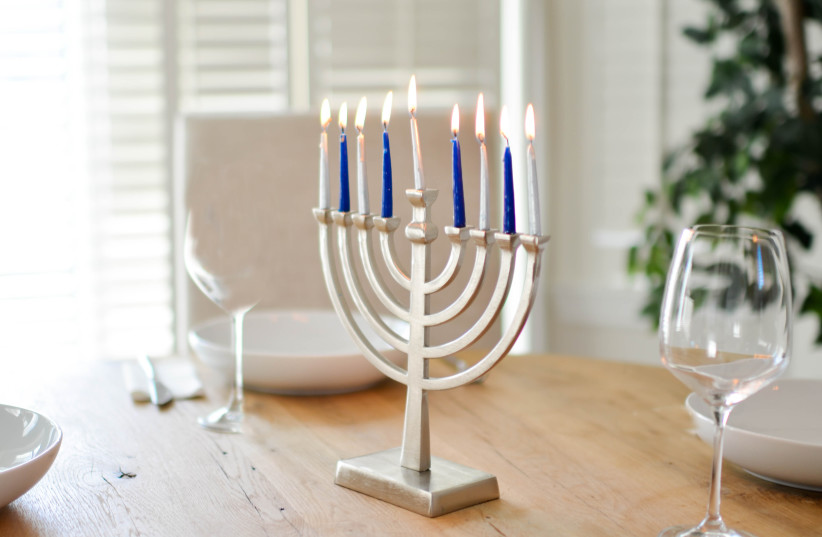The holiday of Hanukkah makes us ask: What is it all about? Let’s see.
The word “hanukkah” means “dedication.” The word appears in the Torah (Numbers/Bemidbar 7:10, 11, 84 and 88) in the dedication of the original Altar (hanukkat hamizbe’ach) in the Tabernacle in the desert after leaving Egyptian slavery. It appears in Psalms (30:1) in a reference to the dedication of the Temple (hanukkat habayit). Today, when a new home is dedicated and the mezuzot are mounted, it is called a hanukkat habayit (dedication of the home). The word also appears in several other places in the Bible, including a reference to the dedication of the wall of Jerusalem (Nehemiah 11:27).
We see that education takes dedication, as the same Hebrew root of chet-nun-chaf is the basis of the word “chinukh,” which is “education.” The teacher, the student, the respective families and the entire educational system need to be dedicated to the education process for it to work successfully.
Of course, “Hanukkah” is also the name of the special eight-day Jewish holiday that begins on 25 Kislev (this year on Sunday night, December 18). The holiday of Hanukkah commemorates the victory of the Maccabees against the Syrian-Greeks and the recapturing, cleaning and rededicating of the Holy (Second) Temple in Jerusalem in 165/164 BCE. The miracle of the victory of the few against the many and of the small amount of olive oil for the menorah lasting for eight days instead of one day infuse the holiday with the mandate to publicize the miracle with the lighting of our own menorah. The very existence of the Jewish people today, millennia later, and its more recent re-establishment in the Land of Israel are also miracles. The rabbinic sages caution us not to rely on miracles (“al somchim al hanes”). However, we thank God and celebrate miracles when they do occur.

How is Hanukkah celebrated?
In addition to lighting a hanukkiah (a special Hanukkah menorah), the holiday is celebrated by playing with a dreidel/sevivon (a spinning top). On the dreidel there are four Hebrew letters, and various games can be played with it. In Israel, the letters are nun, gimel, hey, peh, which stand for “nes gadol hayah po” (a great miracle happened here). Outside of Israel, the letters are nun, gimel, hey, shin, which stand for “nes gadol hayah sham” (a great miracle happened there), referring to Israel.
It is customary on Hanukkah to eat foods fried in oil, such as latkes (potato pancakes) and sufganiyot (donuts), reminding us of the role of that oil played in the Hanukkah story. Gift giving has also become part of the holiday.
The holiday of Hanukkah, coming long after Moses, is obviously not mentioned in the Torah. Hanukkah and the Books of Maccabees are not included in the full Hebrew Bible (Tanach), whereas the Book of Esther and the holiday of Purim is in the Tanach. However, the rabbis over the centuries saw hints of Hanukkah in the Torah based on one of the various levels of interpretation.
In Numbers/Bemidbar 7:1-89 is described the 12-day celebration of the dedication of the Altar mentioned above. It is followed in 8:1-5 with the lighting of the unique central menorah by Moses’s brother, Aaron. Does this hint at a connection between Hanukkah and oil and a menorah? The tribe on the eighth day of this 12-day hanukkat hamizbe’ach ceremony was Menasheh (7:54-59), whose Hebrew name of mem nun shin hey are the same four letters of ha’shemen (the oil). Does this hint at a connection between Hanukkah and eight and oil? In Leviticus/Vayikra 23:1-44, the Shabbat and major holy days are described. It is followed in 24:1-4 with the use of olive oil for the central menorah. Does this hint at a connection between holidays and oil and a menorah?
Much has been written about how to spell Hanukkah in English, since it is a phonetic spelling of the Hebrew word. I have followed the style of The Jerusalem Report here. However, since the variations in its spelling are Ch or H, one N or two, one K or two and H at the end or not, there can be 16 different English spellings of this holiday’s name. Some spellings are more commonly used than others.
The Hanukkah holiday has many aspects and components. When you think of Hanukkah, what do you think of?
- Lighting the Hanukkah menorah (hanukkiah)
- The miracle of Jewish survival in ancient times and over the millennia ever since
- Publicizing the miracle of the oil lasting longer than expected
- Bringing light into the world to dispel darkness
- Increasing holiness in the world as we progress each night from one candle to eight
- Coming together with family and/or friends
- Reflecting on the pressures to assimilate and give up Judaism – in ancient Greek times and today
- Remembering the fighting that occurred among Jewish groups and the resulting civil war
- Fighting an outside enemy who wanted to control us
- The bravery of the Maccabees to stand up for what they believed
- Treasuring religious freedom
- Incorporating some parts of non-Jewish culture into Jewish life
- Spinning the dreidel and playing games
- Eating latkes and/or donuts
- Presents for the children and each other
- Gifts of money (Hanukkah gelt)
- Chocolate coins
- Singing songs
- Other things that you can add!
Actually, Hanukkah can be ALL OF THE ABOVE! Enjoy the holiday! ■
Robert B. Rubin is a rabbi living in Brick, New Jersey.
